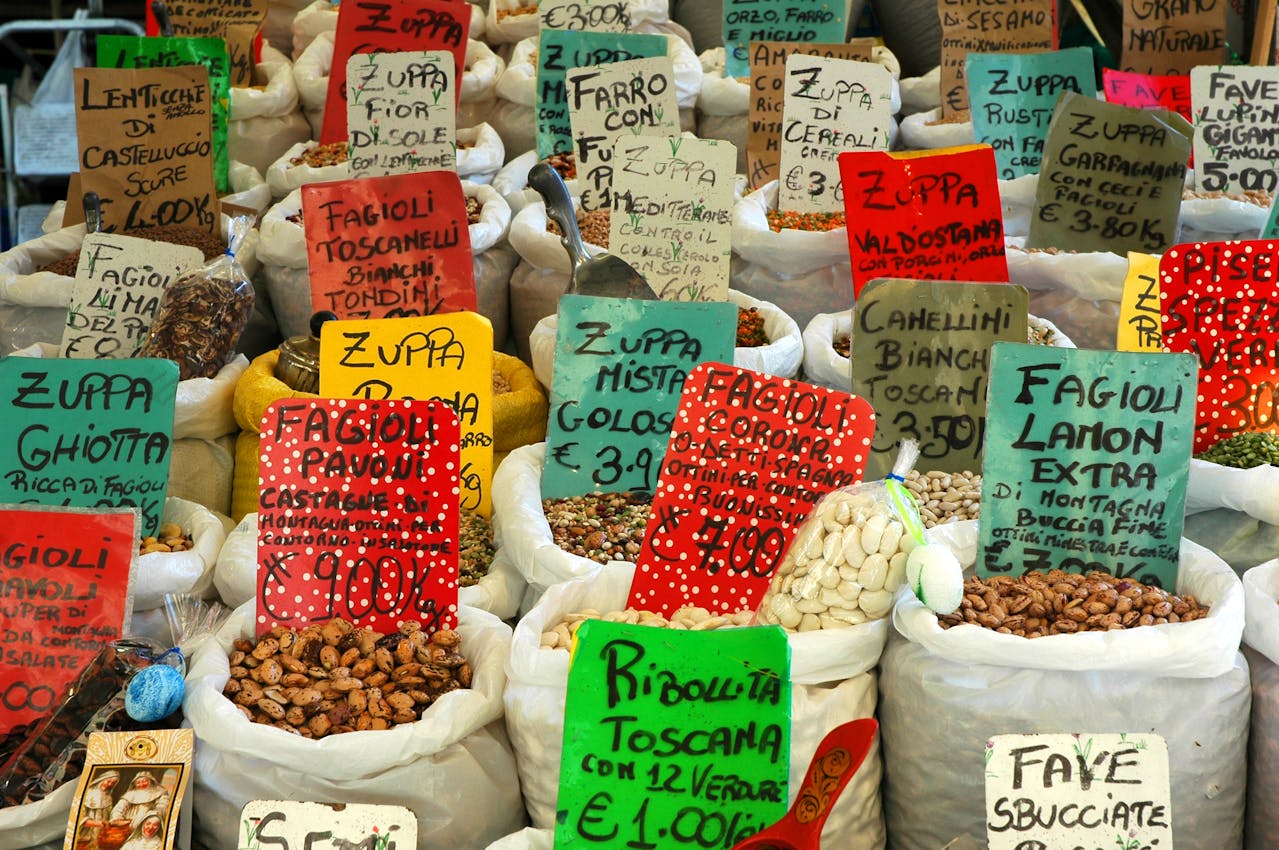
Colourful legumes at a market. Photo by Carlos Machado
How do plant-based eaters get enough protein?
Protein is readily available from plant-based sources such as legumes (beans, lentils, chickpeas), tofu, tempeh, quinoa, nuts, and seeds. Consuming a variety of these foods ensures all essential amino acids are obtained. Research confirms that vegetarians and vegans can meet their protein needs effectively —
How do plant-based eaters get enough iron?
Iron is abundant in plant foods such as lentils, chickpeas, beans, tofu, spinach, and fortified cereals. Consuming these alongside vitamin C-rich foods (e.g., citrus fruits, bell peppers) enhances iron absorption. Studies confirm that a well-planned plant-based diet can meet iron requirements —
How do plant-based eaters get enough calcium?
Calcium is readily available in leafy green vegetables (e.g., kale, broccoli), fortified plant milks, tofu, almonds, and sesame seeds. These foods support bone health and overall nutrition. Research shows that calcium needs can be met without consuming dairy products —
How do vegetarians get vitamin B12?
Vitamin B12 is a particularly interesting nutrient. Many people might think B12 is only found in animal products, but surprisingly, B12 is actually produced by bacteria, while animals merely store and accumulate it. It’s like a transmission chain, where animals play the role of “middle managers” for B12.
In modern industrial farming, since animals can’t get enough B12 from their natural environment, farms have to supplement livestock with B12. In other words, when we get B12 from animal products, this B12 likely comes from supplements in the first place. Meanwhile, our modern society’s excessive pursuit of cleanliness has also reduced our chances of getting B12 from the natural environment.
Here’s how different groups get their B12:
- Meat-eaters obtain B12 indirectly through animal products (these animals often get B12 through supplements)
- Vegetarians need to get B12 directly through supplements or fortified foods
It’s important to emphasize that regardless of dietary habits, everyone should pay attention to their B12 intake. Like checking in regularly with a good friend, we should regularly monitor our B12 levels to ensure they’re within a healthy range.
For more detailed information, please refer to:
Isn’t it natural for humans to eat meat?
Ah, the “natural” argument – which is fascinating because air conditioning and smartphones aren’t natural either, but here we are! When we look at human biology, we’re actually built more like plant-munchers than meat-hunters:
Our teeth are basically flat rocks in our mouths, perfect for grinding plants but pretty useless for tearing into raw meat. Our digestive system is like a long, winding road trip rather than the short express route you find in carnivores. And our saliva? It’s basically designed for breaking down carbs, not meat.
Early humans were more like opportunistic snackers than mighty hunters, mostly eating fruits, nuts, and leaves. We were basically fancy apes who occasionally found some meat rather than apex predators.
What about plants? Don’t they have feelings?
This is one of those questions that, at 3 AM, seems to plumb the depths of existence, but, in the cold light of day, reveals itself as rather whimsical. Plants, you see, lack brains, and they lack nervous systems – they are, in essence, more akin to astonishing organic automatons than to conscious entities. They respond to their surroundings, certainly, but so too does your smartphone, and yet, no one is arranging demonstrations about switching off their iPhone.
But let’s indulge the thought: even if plants did possess feelings (which, let us reiterate, they do not), consuming plants directly would still, in fact, cause less plant suffering than consuming animals. Why, you ask? Because the animals we consume must first consume a vastly greater quantity of plants to grow than we would if we simply ate the plants ourselves. It’s as though there’s a middleman, a conduit, for the suffering of plants that is caused by our diet.